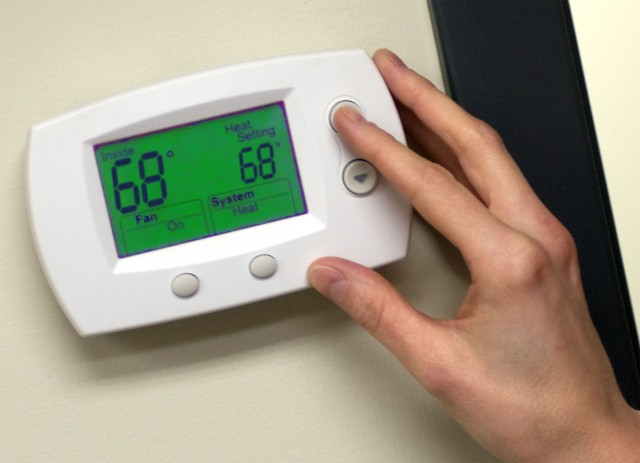
WASHINGTON (Army News Service, Feb. 20, 2008) -- Where Army housing has been privatized, the service has found energy usage has dropped by as much as 10 percent.
In Army privatized family housing under the Residential Communities Initiative, some Soldiers are now getting a statement each month that lets them know how much gas and electricity their families have consumed. Soldiers must pay out-of-pocket for the amount of energy their families use beyond a baseline. The Aca,!A"Soldiers Responsible for Their UtilitiesAca,!A? program is responsible for the decrease in energy consumption.
Aca,!A"As a result of this, where we are actually doing live bill, we have noticed a 10-percent decrease in the amount of energy consumption,Aca,!A? said Ivan Bolden, the Army's public and private initiatives and competitive sourcing division chief for RCI.
In privatized homes, the commercial partners and the Army have worked together to set a baseline for energy consumption. The baseline is an estimate of the amount of energy occupants in a home should use, based on such things as the size of the home, its age, the number of occupants and the season.
Soldiers whose families meet this baseline pay nothing at all. But Soldiers whose families exceed the baseline beyond 5 percent must pay for that extra energy. Soldiers whose families have energy conservation strategies in place and end up using less energy than what is expected will get a rebate check.
Aca,!A"About a third of soldiers are falling in the middle, a third are getting checks or rebates and the other third are having to pay,Aca,!A? said Bolden. Aca,!A"So all in all, about 66 percent are not paying or are getting a rebate.Aca,!A?
As of December 2007, there are homes at Fort Carson, Col.; Fort Hood, Texas; Fort Lewis, Wash.; Fort Meade, Md.; Fort Campbell, Ky.; Fort Belvoir, Va.; and Fort Irwin, Calif. that are being billed in this way for energy usage.
Other installations are currently Aca,!A"mock billingAca,!A? Soldiers for their utilities. Those Soldiers get a statement each month letting them know how much energy they consumed, how much they went over the baseline and how much they might have owed for that over- consumption.
Mock billing allows Soldiers time to adjust their energy usage habits and to get used to the idea of having to pay for over-consumption. Mock billing periods usually last from six months to a year before residents are switched to actual billing.
Today, about 15,000 privatized homes are either being billed or mock billed. That number represents about 20 percent of Army privatized homes.
Bolden said some residents have been concerned that money saved by their own energy conservation efforts is actually being pocketed by privatization partners. But the money, he said, is actually going back into their communities in the form of new homes and amenities.
The program also has protections built in to shelter occupants of privatized homes from price fluctuations in the energy market, and from usage spikes due to unusual weather. Soldiers who are living on the economy donAca,!a,,ct have such protections.
Aca,!A"About 70 percent of Soldiers live off post and are responsible for their utilities each month,Aca,!A? Bolden said. Aca,!A"If there is a hike in the rate, they have to pay for that. With this program, we are simply asking for Soldiers to be responsible for their usage.Aca,!A?
Bolden said the Aca,!A"Soldiers Responsible for Their UtilitiesAca,!A? program is in response to a 1998 policy by the Office of the Secretary of Defense.
Aca,!A"You know, if you donAca,!a,,ct get an electric bill or gas bill, you leave the lights on or you have the air conditioning on and the windows open because you want fresh air,Aca,!A? Bolden said. Aca,!A"When you looked at the energy bill for housing, every year it was going up and up. The SECDEF decided we must put some kind of discipline on this.Aca,!A?
According to Bolden, Soldiers with children or spouses in the Exceptional Family Member Program may be eligible to have their energy usage baseline adjusted, depending on their situation.

Social Sharing